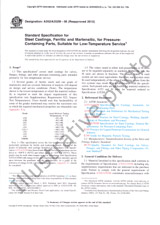We need your consent to use the individual data so that you can see information about your interests, among other things. Click "OK" to give your consent.
ASTM D7321-21
Standard Test Method for Particulate Contamination of Biodiesel B100 Blend Stock Biodiesel Esters and Biodiesel Blends by Laboratory Filtration
Translate name
STANDARD published on 15.10.2021
The information about the standard:
Designation standards: ASTM D7321-21
Publication date standards: 15.10.2021
SKU: NS-1043804
The number of pages: 6
Approximate weight : 18 g (0.04 lbs)
Country: American technical standard
Category: Technical standards ASTM
The category - similar standards:
Annotation of standard text ASTM D7321-21 :
Keywords:
biodiesel, biodiesel blend, diesel fuel, glass fiber filter, gravimetric determination, laboratory filtration, middle distillate fuel, particulate contamination,, ICS Number Code 75.160.20 (Liquid fuels)
Additional information
| Significance and Use | ||||||||||||
|
5.1?The mass of particulates present in a fuel is a significant factor, along with the size and nature of the individual particles, in the rapidity with which fuel system filters and other small orifices in fuel systems can become plugged. This test method provides a means of assessing the mass of particulates present in a fuel sample. 5.2?The test method can be used in specifications and purchase documents as a means of controlling particulate contamination levels in the fuels purchased. |
||||||||||||
| 1. Scope | ||||||||||||
|
1.1?This test method covers the determination of the mass of particulate contamination in B100 biodiesel in accordance with Specification D6751 and BXX blends that are prepared against all No. 1 and No. 2 grade fuels allowed within Specifications D396 and D975. Note 1:?Middle distillate fuels with flash points less than 38
?C have been ignited by discharges of static electricity when the
fuels have been filtered through inadequately bonded or grounded
glass fiber filter systems. See Guide D4865 for a more detailed discussion of
static electricity formation and discharge.
1.2?The values stated in SI units are to be regarded as standard. No other units of measurement are included in this standard. 1.3?This standard does not purport to address all of the safety concerns, if any, associated with its use. It is the responsibility of the user of this standard to establish appropriate safety, health, and environmental practices and determine the applicability of regulatory limitations prior to use. 1.4?This international standard was developed in accordance with internationally recognized principles on standardization established in the Decision on Principles for the Development of International Standards, Guides and Recommendations issued by the World Trade Organization Technical Barriers to Trade (TBT) Committee. |
||||||||||||
| 2. Referenced Documents | ||||||||||||
|
We recommend:
Technical standards updating
Do you want to make sure you use only the valid technical standards?
We can offer you a solution which will provide you a monthly overview concerning the updating of standards which you use.
Would you like to know more? Look at this page.




 Cookies
Cookies
